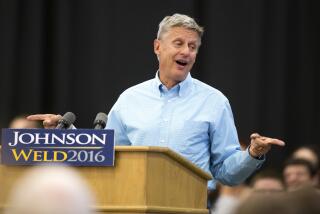Most Americans won’t back third-party presidential candidate, poll finds
- Share via
As calls for civility, bipartisanship and the need to coalesce around the political center grow, the latest survey of the electorate by Public Policy Polling shows that most Americans reject the idea of a third-party presidential candidate.
The finding comes as President Obama has been realigning his administration and moving to the center in preparation for the 2012 presidential election cycle. But the results also show the resilience of the American political system, one of the few to maintain a two-party system over time despite ideological unhappiness.
According to the poll released on Tuesday, 37% of those polled said they would be open to a third-party candidate but that group is sharply divided about the political leanings. About 14% said they wanted someone more liberal than the Democrats while 29% said they wanted someone more conservative than Republicans. The largest part of that group, 48%, said they would back a centrist -- someone more conservative than Democrats but more liberal than the GOP.
Those numbers translate into just 18% of the overall electorate being willing to consider a centrist third-party candidate. While no one has yet formally declared, there have rumblings that a centrist -- especially an independently wealthy one -- might be able to launch such a campaign, similar to some past efforts that were seen as more of a spoiler than serious races.
The poll also found that Republicans are more likely to consider a third-party candidate than Democrats, by 44% to 24%.
“That should be a big red flag for the GOP when it comes to the possibility of nominating someone who the party base doesn’t see as sufficiently conservative,” said Public Policy Polling, which does polling for Democrats. “Republican voters in Nevada, Alaska, Delaware and Colorado this year showed they were willing to lose general elections to prove a point to the more centrist wing of their party.”
When it comes to ideology, 47% of those surveyed thought that the Democratic Party was too liberal while 34% thought it was about right. On the GOP, 45% thought the party was too conservative while 29% thought it was about right.
The poll is based on 632 voters from Jan. 14 to Jan 16. It has a margin of error of plus or minus 3.9%, the poll group said.
Twitter.com/LATimesmuskal
More to Read
Get the L.A. Times Politics newsletter
Deeply reported insights into legislation, politics and policy from Sacramento, Washington and beyond. In your inbox twice per week.
You may occasionally receive promotional content from the Los Angeles Times.









